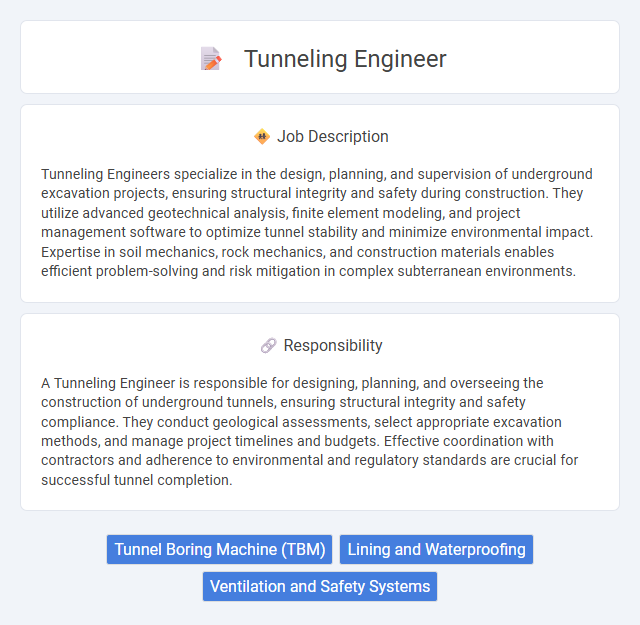
Tunneling Engineers specialize in the design, planning, and supervision of underground excavation projects, ensuring structural integrity and safety during construction. They utilize advanced geotechnical analysis, finite element modeling, and project management software to optimize tunnel stability and minimize environmental impact. Expertise in soil mechanics, rock mechanics, and construction materials enables efficient problem-solving and risk mitigation in complex subterranean environments.
Tunneling engineering likely suits individuals who are physically fit, enjoy working in challenging underground environments, and possess strong problem-solving skills. People with a high tolerance for confined spaces and a preference for teamwork in potentially hazardous conditions may find this career fulfilling. Those who are risk-averse or uncomfortable with physical labor and irregular work hours might find tunneling engineering less suitable.
Qualification
A Tunneling Engineer typically requires a bachelor's degree in civil engineering, geotechnical engineering, or a related field, with specialized knowledge in underground construction and tunneling methods. Proficiency in software such as AutoCAD, Plaxis, and TunnelCAD is essential for designing and analyzing tunnel structures. Experience in site investigation, soil mechanics, and safety regulations enhances qualification, along with certifications like PMP or relevant engineering licenses.
Responsibility
A Tunneling Engineer is responsible for designing, planning, and overseeing the construction of underground tunnels, ensuring structural integrity and safety compliance. They conduct geological assessments, select appropriate excavation methods, and manage project timelines and budgets. Effective coordination with contractors and adherence to environmental and regulatory standards are crucial for successful tunnel completion.
Benefit
The role of a tunneling engineer likely offers substantial benefits, including competitive salaries and opportunities for career advancement in infrastructure development. They may experience job stability due to ongoing demand for underground construction projects worldwide. Access to cutting-edge technology and the chance to work on impactful, large-scale projects could further enhance the appeal of this profession.
Challenge
The role of a Tunneling Engineer likely involves navigating complex geological conditions and managing high-risk construction environments, requiring precise problem-solving skills. Challenges may arise from unpredictable soil behavior and strict safety regulations that demand constant monitoring and adaptation. Success in this position probably depends on combining technical expertise with innovative engineering solutions to overcome these obstacles efficiently.
Career Advancement
Tunneling Engineer roles offer significant career advancement opportunities through specialization in geotechnical analysis, tunnel design, and project management. Gaining expertise in cutting-edge tunneling technologies and software enhances prospects for senior engineering and leadership positions within infrastructure and construction firms. Professional certifications and experience managing large-scale underground projects contribute to accelerated promotion and higher salary potential.
Key Terms
Tunnel Boring Machine (TBM)
Tunneling Engineers specializing in Tunnel Boring Machines (TBM) manage the design, operation, and maintenance of these complex machines to ensure precise, efficient underground excavation. Expertise in TBM technology includes monitoring machine performance, managing soil conditions, and optimizing cutting head configurations to enhance tunnel stability and progress rate. Proficiency with TBM data analytics and geotechnical surveys directly impacts project safety, cost control, and on-time delivery of large-scale infrastructure tunneling projects.
Lining and Waterproofing
Tunneling engineers specialize in the design and implementation of lining and waterproofing systems to ensure the structural integrity and durability of underground tunnels. They select and apply materials such as shotcrete, segmental linings, and waterproof membranes to prevent water ingress and mitigate ground pressure. Expertise in advanced sealing techniques and drainage management is critical to maintaining tunnel safety and longevity.
Ventilation and Safety Systems
Tunneling engineers specializing in ventilation and safety systems design and implement comprehensive airflow strategies to ensure air quality and remove hazardous gases during underground construction. They utilize advanced ventilation modeling software to optimize fan placement, airflow rates, and emergency evacuation protocols, enhancing worker safety and regulatory compliance. Continuous monitoring of gas concentrations, temperature, and particulate levels is essential to prevent accidents and maintain healthy working conditions in tunnel environments.
 kuljobs.com
kuljobs.com